•
FILMS • 2006 •
WATSONVILLE ON STRIKE
(Director: Jon Silver, 1989, 65 min)
Chronicling one of the most important labor battles of immigrant workers in the history of the United States, Watsonville On Strike is an intimate view of the 18-month cannery workers’ strike which virtually paralyzed this rural California town during the years 1985-87. Vivid scenes of Teamsters Union members debating strategy, demonstrating and confronting police are combined with poignant interviews of the strikers—mostly Mexican women. Original music by José Luis Orozco.
VOICES: 20th Anniversary of the Watsonville Strike
Broadcast live from the Community Television studio, this TV call-in show is devoted to a panel discussion of the historic Watsonville cannery workers’ strike and its implications for workers in this community today. Panelists include Jon Silver, whose exacting documentary, Watsonville On Strike, airs just prior to Voices. Also sharing the panel are labor activist and former Mayor Oscar Rios, local writer and historian Frank Bardacke, and cannery workers who participated in the strike.
Link to Community Television website.
WEIRDED OUT & BLOWN AWAY
(Director: Sharon Greytak, 1986, 43 min)
This ground breaking film by a wheelchair user offers insights into the social and personal relationships of disabled men and women, perceptions of their physical and professional images, difficulties encountered on job interviews, ranking of disabilities according to social acceptability, sexuality, and vulnerability to crime. Speaking bluntly and with humor, the participants point to the common ground shared by the disabled and non-disabled alike.
Link to Cinema Guild’s webpage on Weirded Out & Blown Away.
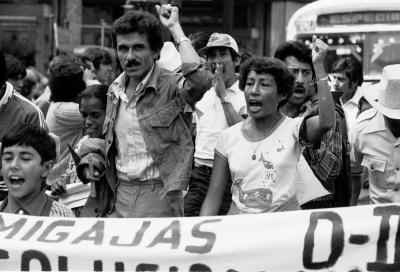
[photo credit: Jorge Acevedo]
GRANITO DE ARENA (Grain of Sand)
(Director: Jill Freidberg, 2005, 61 min)
The inspiring, and sometimes unsettling, story of the Mexican teachers’ movement and their grassroots, non-violent struggle to defend public education from the devastating impacts of economic globalization. Winner Best Documentary, International Documentary Festival Tres Continentes, Caracas, Venezuela.
Interviews with internationally-recognized figures, such as Eduardo Galeano and Maude Barlow, place the Mexican teachers’ struggle in a global context, clearly spelling out the relationship between economic globalization and the worldwide public education crisis.
“Important…disturbing…a film that views education from below, from the classroom and the community. Anyone concerned about education, human rights, labor unions, Latin America, and globalization will want to see this inspiring film.” —Mexican Labor News and Analysis
This documentary also gives voice to the increasing number of teachers within the movement who believe the movement itself is in crisis and who are exploring community-based alternatives in their struggle to defend public education.
Link to Corrugated Films website.
REDESIGNING SCHOOLS TO RAISE ACHIEVEMENT: IT’S UNION WORK!
(Producer: UFT NY Teachers Center, 2004, 30 min)
The teachers union and school districts are working together to implement a research based reform model whose main goal is to increase the achievement levels of all students. The model was initiated by AFT and used successfully in school districts in New York City, ABC District in Southern California and other places.
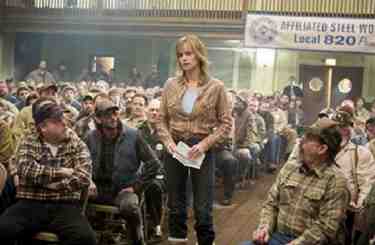
NORTH COUNTRY
(Director: Niki Caro, 2005, 126 min)
A fictionalized account of the first major successful workplace sexual harassment case in the United States—Jenson vs. Eveleth Mines—where a woman who endured a range of abuse while working as a miner filed and won the landmark 1984 lawsuit.
It's hard to believe just 16 years ago such vicious, malignant and atrocious on-the-job sexual harassment was not uncommon and even promoted by uncaring bigwigs who were too busy counting profits instead of counting women as part and parcel of the American work force.
Link to Warner Bros. webpage on North Country.
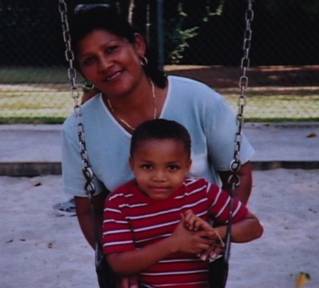
MAID IN AMERICA
(Director: Anayansi Prado, 2004, 58 min)
Housekeeper. Nanny. Maid. Surrogate mother. Such are the many roles of las domésticas, undocumented workers who came to America in search of a better life and found themselves scrubbing toilets and setting tables, working long hours for little pay in private homes. Most have no health insurance, no driver license, no pension, and no recourse when it comes to employment injustices. They cook meals they could never afford to eat, clean houses they could only dream of owning, and care for strangers’ children when their own children are thousands of miles away. Deportation is a constant fear. And still they come to the United States by the thousands in hopes of a better life for themselves and their families.
Link to Women Make Movies webpage on Maid In America.
WAL-MART: THE HIGH COST OF LOW PRICE
(Director: Robert Greenwald, 2005, 95 min)
A feature length documentary that uncovers a retail giant’s assault on families and American values. The film dives into the deeply personal stories and everyday lives of families and communities struggling to fight a goliath. A working mother is forced to turn to public assistance to provide healthcare for her two small children. A Missouri family loses its business after Wal-Mart is given over $2 million to open its doors down the road. A mayor struggles to equip his first responders after Wal-Mart pulls out and relocates just outside the city limits. A community in California unites, takes on the giant, and wins!
Link to WalMartMovie.com website.

WAGING A LIVING
(Producer: Roger Weisberg, 2005, 85 min)
A three year chronicle of the lives and struggle of four low-wage workers to survive from paycheck to paycheck. This unvarnished look at these workers’ dreams, frustrations, and efforts to escape poverty offers a sobering view of the elusive American dream. "“I wanted viewers to understand what it’s like to work hard, play by the rules, and still not be able to support a family,” writes producer Weisberg.
The term working poor should be an oxymoron. If you work full time, you should not be poor, but more than 30 million Americans—one in four workers—are stuck in jobs that pay less than the federal poverty level for a family of four.
Link to Public Policy Productions’ webpage on Waging A Living.
NINE AND A QUARTER
(Filmmaker: Mathilde Rand, 2006, 15 min)
Documenting the campaign to raise the minimum wage in Santa Cruz, the film gives an overview of its history and centers on two points: the present situation of low wage workers, and the impact on businesses and workers when a measure to raise the minimum wage passes. Conversations with people involved and the use of available research focus light on those points. An underlying question is, “What happened to the eight hour day?”
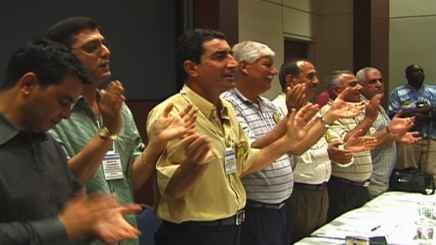
MEETING FACE TO FACE
(Director: Jonathan Levin, 2005, 27 min)
Documentary of the US nationwide tour of Iraqi labor union leaders in June 2005 and its impact on the passage of a resolution at the AFL-CIO Convention calling for US withdrawal from Iraq.
The film breaks through the media walls that keep Iraqi and labor voices out of the debate about the war in the United States and brings the voices of Iraqi working people directly into the conversation as we consider the war and continuing occupation and what the next steps should be. We also see working people in the US bringing new energy and commitment to the movement for peace, social justice, and a humane foreign policy.
As the war in Iraq rages on, more and more people in the US are questioning what our country is doing there and what the next steps should be. Immediate withdrawal? Maintaining a military presence to avert civil war? Yet we almost never hear from the people most directly affected by the Iraq war—the Iraqis themselves.
Helping to bridge this gap in understanding, the film follows six senior Iraqi labor leaders through 25 cities during the June 2005 Iraq-US Labor Solidarity Tour, sponsored by US Labor Against the War. Speaking to American audiences for the first time, Iraqis explain why the primary condition for a peaceful resolution in Iraq is ending the US occupation and why an independent labor movement is crucial in creating a democratic society. The film was produced by US Labor Against the War with support from the Reel Work Labor Film Festival.
Link to the Meeting Face To Face website.

ENTER THE OIL WORKERS
(Producer: Bolivarian Circle of Global Women's Strike, 1994, 34 min)
Oil workers and others describe how they saved Venezuela’s oil industry from a CIA lockout. Workers in this industry were not particularly involved in the social revolution taking place in their country until their industry was targeted by a foreign power. Features women workers who emerged as dynamic union leaders.
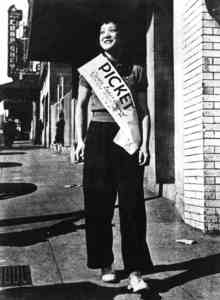
LABOR WOMEN
(Director: Renee Tajima-Peña, 2002, 35 min)
A portrait of three immigrant daughters who are part of a new generation transforming the American labor movement. Quynh Nguyen is a trilingual organizer who moves easily between Vietnamese, Spanish, and English as she mobilizes meatpackers in their demands for a union contract. Sri Lankan American Karla Zombro confronts the challenge of being a lead organizer as well as openly gay within the Respect at LAX Living Wage campaign for airport workers fighting for a contract with the Argenbright company. Jun Chong is a Korean American activist with a labor-community coalition in South Central Los Angeles. She represents the most marginalized of workers—welfare recipients who are being forced into workfare programs. Nguyen, Zombro, and Chong are nothing like the albeit rare enough images of young Asian American women you would usually see in the media, whether the submissive lotus blossom of the past or the young dot-commer “model minority” of today. Rather, they are passionate advocates for social change, and theirs is the story of the American labor movement as it is becoming in the 21st century.
Link to Progressive Films’ webpage on Labor Women.
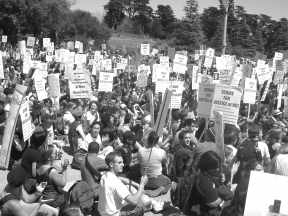
ESTAMOS AQUÍ
(Filmmakers: Colectivo Media Insurgente, 2006, 10 min)
Students produced this documentary about the historic UC-wide AFSCME strike in 2005 and the militancy of UCSC's students and workers which made it a success.
CAPITAL FLIES
(Filmmakers: Emily Encina & Kyle Gleason, 2006, 18 min)
A provocative look at the changes in the life of Sarah Lopez, who immigrated from Mexico and began working in the agriculture fields at age 12. Sarah is one of the 1,000 factory workers laid off in the past year due to the numerous plant closures in Salinas, California. While the town’s development projects bring in shopping malls and track homes built on farmland, the increasing globalization of the market diminishes jobs in the factory and the field. Sarah’s story of struggling and coping with these changes is one that is experienced by much of the working class in the Salinas Valley.
RAINBOW THEATER
Rainbow Theater productions are designed to increase awareness of the cultural climate at UCSC and in the City of Santa Cruz. The group's artistic purpose is to create unity, increase visibility and understanding of various ethnic groups, and encourage the celebration of American ethnic diversity and culture.
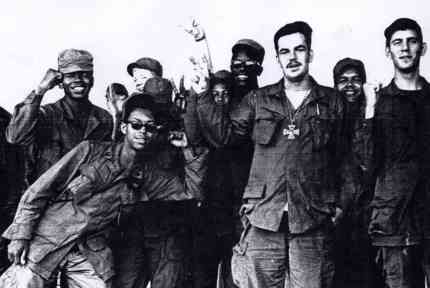
SIR! NO SIR!
(Producer: David Zeiger, 2005, 85 min)
A compelling new look at the GI Movement, the concerted effort by active duty soldiers and sailors to protest the Vietnam War. The story of one of the most vibrant and widespread upheavals of the 1960s—one that had profound impact on American society, yet has been virtually obliterated from the collective memory of that time.
An important and largely forgotten element of the war in Vietnam, the GI Movement resulted in many active duty servicemen and women being tried and convicted of mutiny among other offenses, simply for opposing a war now considered by many to have been both unjust as well as extremely poorly planned and executed. One key note in the film was the first examination that I have seen of the idea that returning soldiers were spit on and called “baby killers” by peace activists in the US. A few of these stories are dissected and found to be fictions, ones likely drawn up by those trying to discredit the anti-war movement.
Link to the Sir! No Sir! website.
ACTIVISTS’ DOCUMENTARY FILM WORKSHOP
(Presenter: Paul Espinosa, filmmaker)
Students and the community are invited to this two hour workshop by an award-winning independent filmmaker who will discuss different aspects of production and how to manage content. Participants will gain insight on topics such as interviewing techniques, film production abroad, and the use of archival material in documentary.
For information and RSVP, call Elizabeth Freese-Cabrera at 530-867-5543 or e-mail efreesec@ucsc.edu
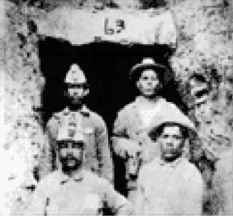
LOS MINEROS
(Director: Hector Galán, 1991, 60 min)
This documentary recounts the 50-year story of Mexican-American miners and how their struggles shaped the course of Arizona history between 1903 and 1947. The pitched labor battles of los mineros began with the first strike in 1903. It was not until 1946 that the two-tier wage system for whites and Mexicans was abolished. The film recounts the rise and fall of three small towns—Superior, Clifton-Morenci and Sonora—where the mining of copper ore dominated the lives of all the inhabitants. Using archival footage and the testimony of witnesses, the film examines the mineros’ struggles for equal pay and fair working conditions.
Link to the website of Paul Espinosa Productions.
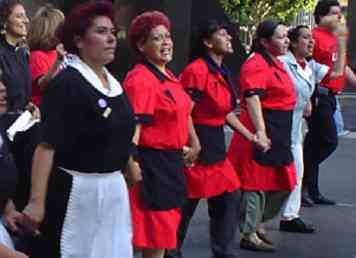
CALIFORNIA AND THE AMERICAN DREAM
(Director: Paul Espinosa, year, length)
This Series explores the dynamics of culture, community and identity in one of the most diverse regions in the world. In the last 35 years, California has become a laboratory for divergent social trends. Together, these trends have so radically transformed the state that it bears little resemblance to the Hollywood dreamscape it projected in previous decades. In the post 9-11 era, California is center stage for an array of issues re-defining the American agenda—from changing demographics to new models of civic engagement, from the role of immigrants in neighborhood life to the challenge to democracy by the initiative process, from sustainable agriculture to Native American gaming and sovereignty.
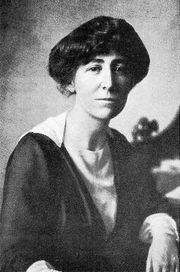
A SINGLE WOMAN
A powerful, dramatic and timely play about Jeannette Rankin, the funny, brilliant, warm, irascible, scrappy woman who voted in Congress against both World Wars. The WWI vote landed on her in her first 6 days in 1917, and she was totally alone in her vote against WWI, like our Congresswoman Barbara Lee about Iraq, as well as our Senator Barbara Boxer about the last election. The first vote was taken on Good Friday, “the anniversary of the most notorious murder in history,” as Jeannette Rankin pointed out while she tried to delay the vote in order to get people to think!
Working with the Women’s International League for Peace and Freedom in Europe, Jeannette railed against the Treaty of Versailles as it would “create a monster” by punishing Germany. In the US, she led a Peace Parade at the Republican convention in Chicago in 1932 with the National Congress of Jewish Women and church groups, and recent Nobel Peace prize-winner Jane Addams. They were calling for Peace Planks to outlaw war forever (urging Democrats to do the same). As founding Vice President of the ACLU, she urged President Roosevelt to rescue Jews and religious and political prisoners from Europe as early as 1933. The ACLU effort was shamefully rebuffed.
A major suffragist since 1910, Jeannette Rankin was the first woman in Congress, voted in from Montana in 1916, four years before women even had the vote nationally. In fact, she was the first woman elected to the legislature of any western democracy. Jeannette Rankin fought for equal pay and an 8-hour day for women, child labor laws, the rights of Native and African Americans, and rights of immigrants, including the first bill for immigrant women’s rights to citizenship independent of their husbands. Gerrymandered out of her district in Montana, she lived in her own dirt floor house and worked in Georgia among poor people for a system of direct representation in presidential elections. During those decades she devised a multi-candidate system for a broader spectrum of Congressional representation.
After fighting against the Korean War in her 70s, at 88 she led the Jeannette Rankin Brigade Peace Parade of 5000 women on the US Capitol against the Vietnam war and demanded unilateral disarmament, nuclear and otherwise. She spoke out against the corporate take-over of America. She left funds in her will for educational aid for poor women over the age of 35.
The play is based primarily on Jeannette’s own interview by the UC Berkeley Bancroft Oral History Library’s Suffragists Oral History Project.

LOCKOUT 484
(Filmmakers: Laura Vazquez & Rosemary Feurer, 2005, 18 min)
Union members in Meredosia, Illinois have been locked out of their factory for over a year. A transnational corporation bought their chemical firm and demanded up to a 33% cut in pay and a reduction of health care benefits. When workers balked, they were barred from employment. Scabs are now running the plant and the local police are completely under the control of the company. The story of this ongoing struggle is amazing in terms of how a group of unionists can endure so much abuse and police harassment, and keep going.
Link to Boilermakers Union Local 484 website.
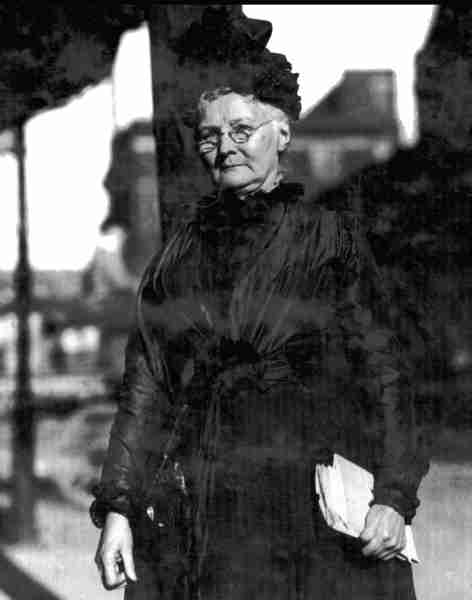
[photo credit:
Northland Poster Collective]
MOTHER JONES
The author giving a dramatic reading from her book, Ronnie Gilbert on Mother Jones: Face to Face With The Most Dangerous Woman in America.
REBUILDING REALITY
(Mathilde Rand, 2006, 20 min)
How to rebuild a devastated area after Katrina? Biloxi’s well-organized efforts have attracted many from far away. Skilled tradespeople, union members, and professionals have joined the reconstruction to help with exacting tasks such as sheetrocking, carpentry, and techiniques of demolding homes.
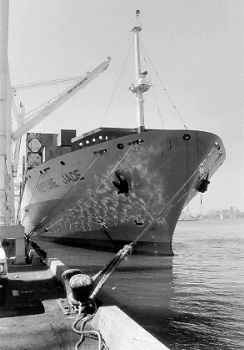
SOLIDARITY HAS NO BORDERS: VOYAGE OF THE NEPTUNE JADE
(Producer: Labor Video Project, 2005, 23 min)
Displaying firm international solidarity, West Coast, Canadian and Japanese longshoremen refuse to unload the container ship, Neptune Jade, which had been loaded by scabs in Thamesport, England after the port owner sacked 500 dockworkers.
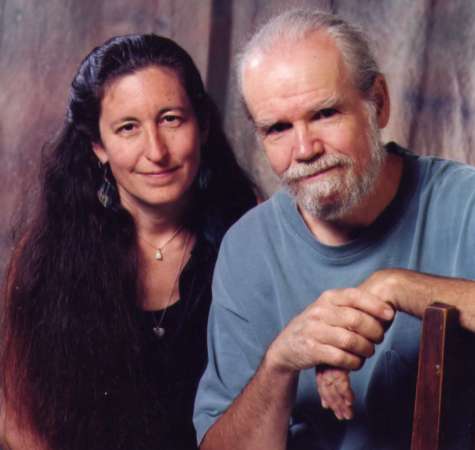
CHARLIE KING & KAREN BRANDOW IN CONCERT
The story of Labor is written in song. Join us for an evening of music - contemporary, historical and hysterical—songs that roast the boss, celebrate the spirit of labor, lampoon the power brokers then and now. Charlie King and Karen Brandow have been singing union songs on 4 continents with a repertoire going back 150 years. They perform with the sweet and precise harmonies of life partners. They sing and write passionately about the extraordinary lives of ordinary people. This evening promises to be a full-throated review of working people’s history and present reality—songs, stories and political satire.
Link to Charlie King’s website.
| Schedule
| Films | Speakers
| Venues | Sponsors
|
|